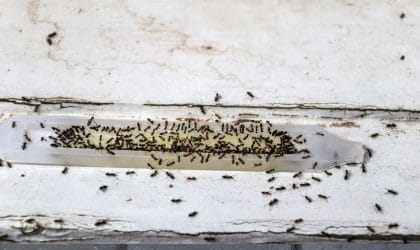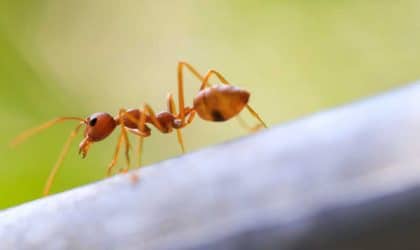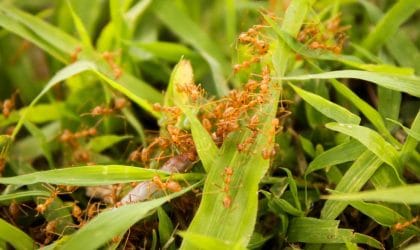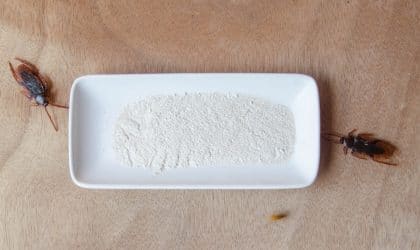Best Pet Safe Ant Killers – Effective, While Harmless to Kids and Pets
If you have an ant problem, and also pets or little humans running around, you have to look for remedies that are pet and child safe. Here are the most effective and best ones on the market today.
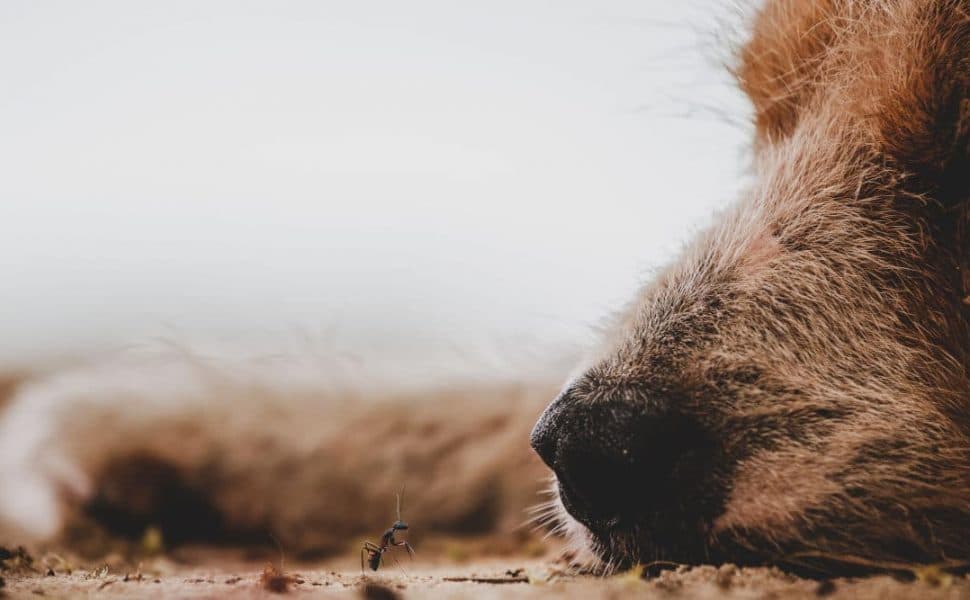
In this article, we will show you what to look for in the best pet safe ant killers. We’ll run you through which insecticides are irritants to dogs and cats, plus recommend the current products on the market today.
All of us, as owners of fur babies and other pets, know that they are curious creatures. Mostly cats and dogs.
Plus, despite their superior sense of smell, they will still eat questionable things that we would give a wide berth. So, when it comes to choosing and applying insecticides to get rid of ants or any other pest, we must take them into consideration.
When they are on the scent and looking to find the source of a new smell, they will get into places that we cannot. So if you think hiding ant bait behind furniture is enough to keep them safe, you are sadly mistaken.
Most over the counter ant killer products contain small doses of chemical pesticides, which means they aren’t a significant poisoning concern.
However, the effect it has will ultimately come down to the size and age of the dog as well as how much of it was ingested.
Some pets will gobble the whole lot, and therefore consume it in large quantities. And sometimes, it will come into contact with their paws and fur, which they will then lick.
Either way, it’s always best to keep them far away from it when you first apply the pest killer.
OK, enough small talk! Let’s get on with looking at some of the best pet friendly ant killers.
Are Regular Ant Killers Unsafe for Dogs and Cats?
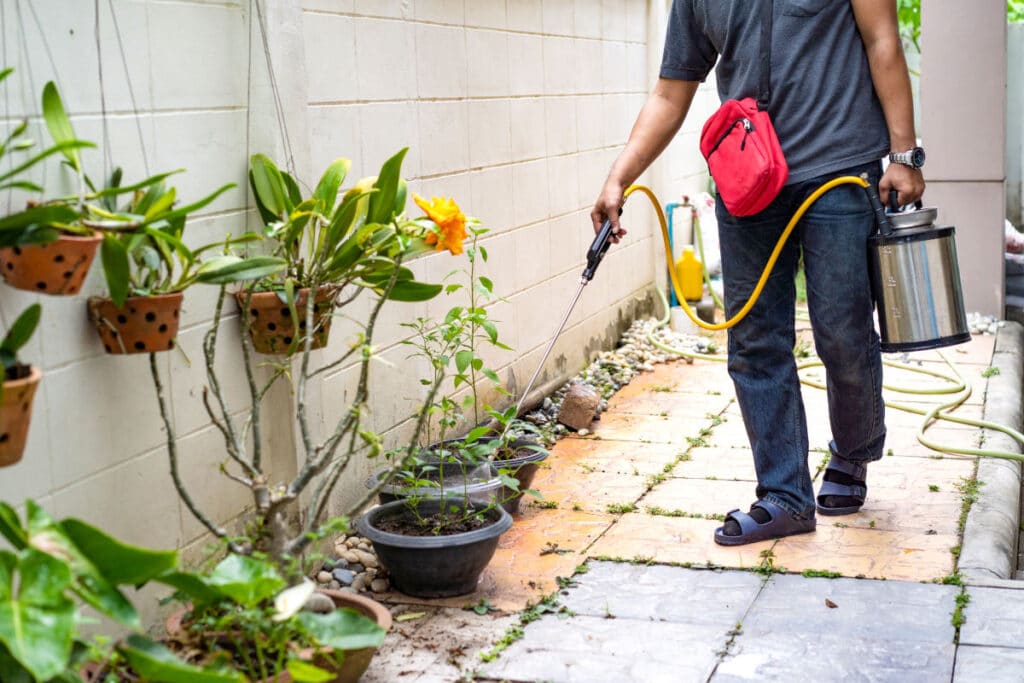
The vast majority of off the shelf pesticides use a mix of two common chemicals. They are pyrethroid pesticides and borax-based pesticides.
There are many more chemicals that can be used, but these two are the most common. Other commonly used chemicals are fipronil and abamectin.
Here we will break down what these chemicals are and why they are bad for pets.
Pyrethroid
These pesticides are manmade and mirror natural pyrethrins found in chrysanthemum flowers. These flowers are known to be poisonous to insects and mildly toxic to humans and animals.
This type of insecticide is a neurotoxin that attacks the sodium channels of the insects that eat it. Which, in turn, causes paralysis.
The low toxicity level of pyrethroid pesticides means that the chances for severe poisoning are slight. It can, however, have a stronger effect if animals ingest it before it has been diluted and mixed.
Absorption through paws and contact with skin is also very low, so irritation and reactions are rare.
Borax
Borax and boric acid products have been used for many years as a cleaning and cutting agent in many household products.
This includes the use of borax as a pesticide mixed with other ingredients. Or it can be used as a neat application applied to the ground as an ant preventative.
Borax, unlike some other pesticides, is actually a naturally occurring chemical compound. But that doesn’t mean it is entirely safe.
Borax is incredibly toxic to bugs, plants, and fungi, but is also harmful to pets and humans. Contact can cause redness and irritation of the skin and eyes, while inhalation can cause coughing and shortness of breath.
The estimated lethal dose for human adults is just 10 to 25 grams, and less than 5 grams can kill a child or pet.
Borax poisoning is quickly apparent with symptoms including vomiting, diarrhea, shortness of breath, stomach pains, drooling and excessive thirst.
Abamectin
This is a common insecticide used for fire ants, known by many names, including Avermectin B1 and MK-936 scientifically. And a few of its product names are Affirm, Agri-Mek, Avid, Dynamec, Vertimec, and Zephyr.
It is a compound derived from the soil bacterium, Streptomyces avermitilis. And it is produced as part of the natural fermentation product of this bacterium.
It works by breaking down an ant’s central nervous system. It works similarly to other pesticides but does it in a slightly different fashion.
It is designed to penetrate the synapse of the ant’s brain that controls neuromuscular transmissions. Once broken, the defective synapses cause paralysis and then death.
Fipronil
Fipronil is a fine white powder with a musty, mold-like odor, and it belongs to the phenylpyrazole chemical family. These are insecticides designed to block the glutamate-activated chloride channels found in insects.
Generally, as humans and mammals do not have these channels, it is not toxic to them.
It can, however, be an irritant to humans and pets alike. It can cause problems such as alopecia, change of coat color, and skin irritation, which in exceptional cases, can lead to broken skin and open wounds.
Fipronil is commonly used as an insecticide. This is because there seems to be little or no resistance to it, despite being used for over 30 years.
What Are Pet Safe Ant Killers? And What Makes Them Pet Friendly?
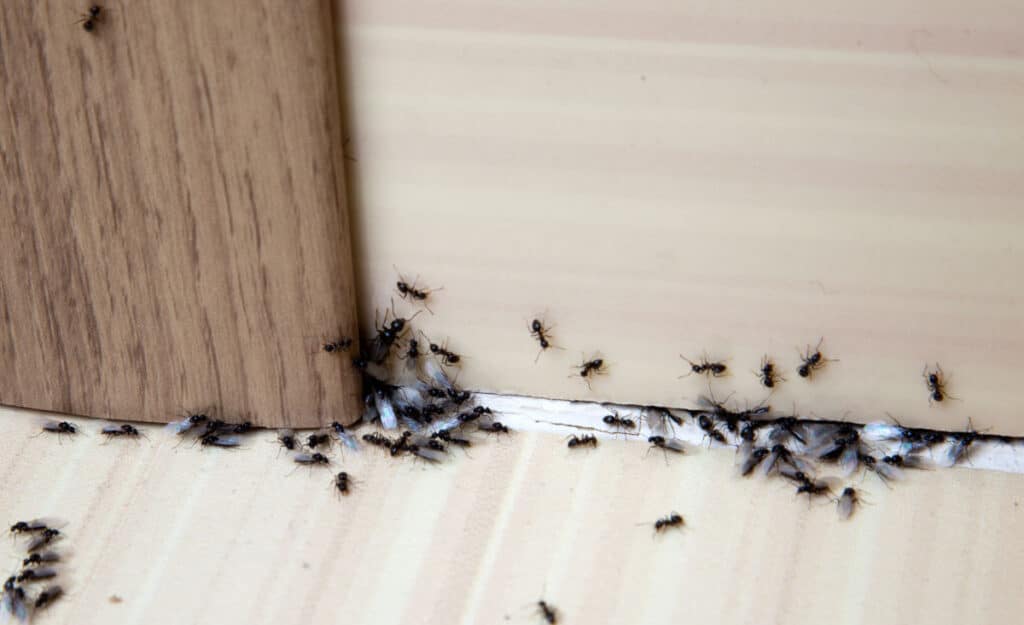
Being ‘pet safe’ is a general term used to describe products that are either non-toxic to pets. Or they show minimal toxicity when they come into contact with it.
As touched on before, the term can be applied to pesticides that are relatively safe to pets indirectly. But they can still be poisonous if ingested undiluted.
In general terms, it is used to describe products that have been designed to kill ants without causing a hazard to pet health if they encounter them. The main pets it refers to are usually cats and dogs.
The label will detail which pets it does pose a risk to. Some insecticides are more toxic to cats than dogs, so bear this in mind when scanning labels at the store.
When talking specifically about pet-friendly ant killers, we believe it should do two things well. And that is, namely, kill ants and be easy to apply.
If a product must be applied using special measures, or it puts an area out of use for your pet for an extended period, as far as we are concerned, it isn’t pet friendly. It’s just as toxic as a toxic product.
They are labeled as pet-friendly and will kill ants very effectively, but they are harmful to pets in certain forms.
These products usually have an application process that requires you to keep your pet away from the area until it is either dry (after applying wet). Or after a certain amount of time when most of it has evaporated or broken down enough to no longer pose a risk.
On the other hand, many organic products are labeled as pet-friendly but have no real effect on ants. The easiest way to find this out is to read through the reviews of each product.
If it has a below-average score and people are saying it has little effect, it probably isn’t an ant killer. And ultimately, there’s little point in buying it.
What Types of Insecticides are Pet-Friendly?
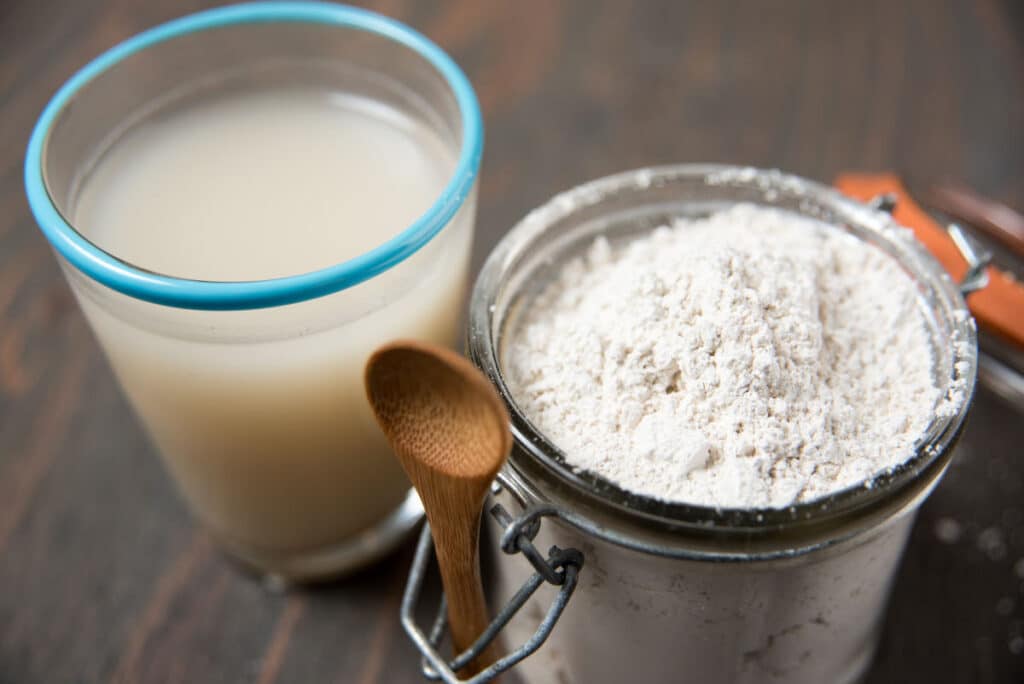
Here are some of the active ingredients in most common ant killers that are generally considered safe. As well as being fuss-free to apply and manage around your pets:
Diatomaceous Earth
In short, diatomaceous earth is fossilized shells of microscopic waterborne creatures called diatoms. These tiny, fossilized remains are made of a substance called silica that is naturally occurring and found in many living organisms as well as making up 26% of the earth’s crust.
And it has many applications for both human and animal health benefits.
It is available in agricultural and food grade. Unlike pesticides, it does not need to be ingested by ants. It merely comes in contact with them, sticks to their exoskeleton, and breaks it down so much that they lose water from their bodies and dehydrate, causing death.
It is only harmful to pets if a large amount is inhaled, in which case it can cause minor irritation to the lungs.
Natural Essential Oils
Concentrated extracts from a single plant can be an effective and safe way to deal with ants. Examples would be orange oil, thyme, clove, peppermint, cinnamon, geranium, and wintergreen.
Some will both kill and deter ants with the overpowering smell that sends their communication signals into meltdown. Others will just keep them from the area where it is applied.
The only risk from concentrated oils is minor skin irritation for those that are sensitive. Or eye irritation if it is splashed or indirectly rubbed into the eye with fingers or paws.
Cedarwood oil is one of the most effective essential oils. When it is sprayed between the ants and a food source they are seeking, it stops the ants from moving toward the food. Cedarwood is also effective against invasive ants such as fire ants.
D-Limonene
Thisis a highly concentrated orange peel extract that acts as a nerve toxin for insects. So, it kills and deters with its strong scent.
It is a concentrate, so it can be an irritant to the throat and airways if ingested in large quantities.
2-Phenethyl Propionate
This is an ester of phenethyl alcohol and propionic acid, and is found in various plants and plant products, including apple brandy, apple cider, beer, guava, peanuts, and rum.
In Texas, it is classed as a ‘green’ pesticide.
It is mainly used in traps, which limits the chances of it being consumed by anything other than the small insects it targets. Plus, when pets do manage to get hold of it, it’s in such small doses that the Environment Protection Agency has stated that it rates a near-zero risk.
Borax or Boric Acid
As touched on before, sodium borate salts are natural minerals often used as pesticides.
Although toxic in large quantities, the small amounts used in ant bait products are generally considered non-toxic to dogs, cats, and even fish and birds.
Indoxacarb
This a chemical pesticide with low toxicity levels according to laboratory testing. In raw format, it is a white powdered solid material formulated as a soluble concentrate.
It works on insects by blocking the sodium ion in nerve cells making nerve cells lose function. This leads to paralysis and then death. From application to death is 24 to 60 hours.
Spinosad
This is a naturally occurring bacteria in the soil that can be refined into an insecticide.
The spinosyns that make up this bacterium are used because they are more toxic toward the target insects, such as ants, compared to other mammals such as cats and dogs.
In powder form, it can cause slight irritation to the skin and eyes if it is blown into the face.
Are Pet Safe Ant Killers as Effective as Regular Insecticides?
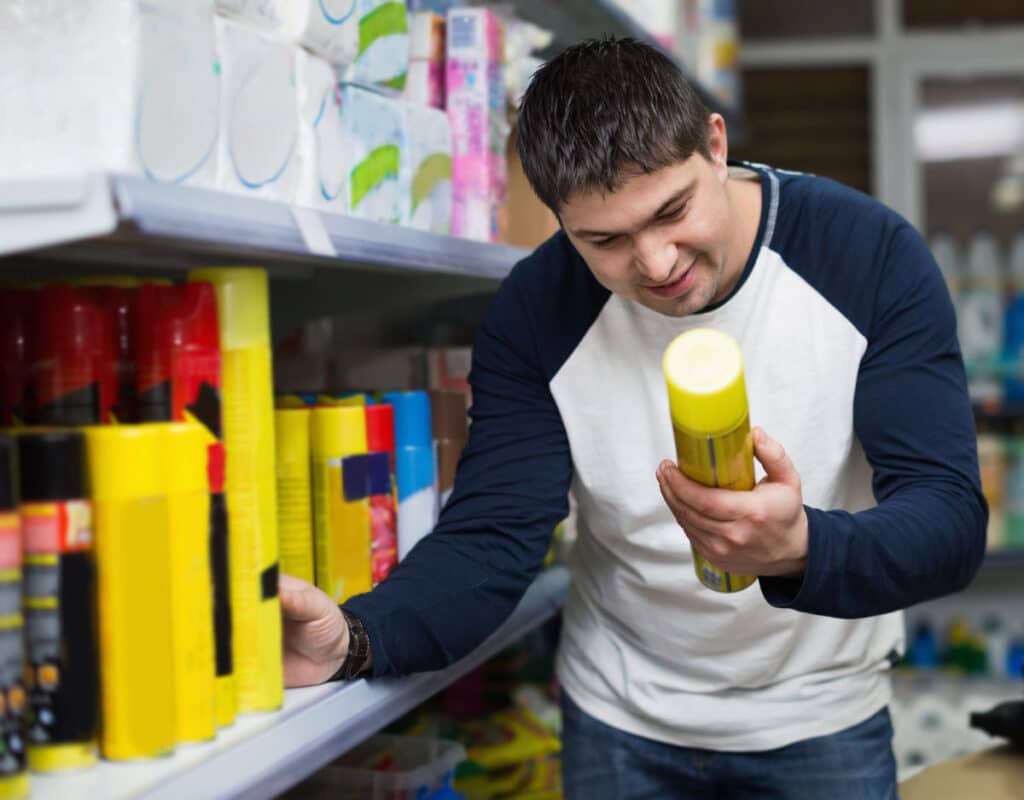
The general consensus is that yes, they are as effective as regular insecticides. While some would argue they aren’t, it is clear from online reviews that many have found them to be effective and a great alternative to harsh chemicals.
The main concern for the minority is that they aren’t always fast-acting when they are labeled as a kill on contact product.
The element to be aware of is that some pet safe ant ‘killers’ don’t actually kill the ants; they just repel them and prevent them from entering the home.
While these products can kill ants if enough is sprayed to drown them, they will not get rid of excessive amounts of ants in the home.
So be sure to read the label and understand what the product does before ordering it.
How to Choose the Right Pet Safe Ant Killer for You
The right pet safe ant killer can come in many forms depending on how curious your pet is. If your pet isn’t curious, it’s relatively straightforward because you can choose a bait station that contains the ant killer within and poses minimal risk.
If, however, your pets like to sniff and lick everything, or they chew everything in sight, bait stations might not be suitable.
In this case, you will be better off with a completely organic and natural product, like essential oils or diatomaceous earth.
Overall, no matter whether you have a cat, dog, rabbit, or bird, always read the label. It is a legal requirement that the manufacturers list the active ingredient clearly.
They will also detail how safe it is towards pets by giving you instructions on what to do with the product. Like we said before if you can’t spray it or apply it in the same room as your pet, it probably isn’t that safe for them.
Once you know what the active ingredient is, you can also look online to see how safe it really is and what kind of risk it poses to different types of animals.
Best Pet Safe Ant Killers in 2020
In no particular order, here are our top picks for the best pet safe ant killers:
Harris Food Grade Diatomaceous Earth
This Harris product is composed of 100% ground food-grade organic diatomaceous earth, with no additives or fillers. It also has no expiration date like some other products, because after all, it is fossilized remains.
It is mined in Nevada and packaged in Georgia, and it comes in a 5lb airtight bag. Complete with a powder duster, which makes for an easy, mess-free application.
As you already know, the product is made of the naturally occurring fossilized remains of diatoms. Harris grinds the diatoms up into a fine white powder that has microscopic sharp and abrasive edges.
These edges puncture and break down the hard exoskeleton of ants and absorb the lipids, which is the oily barrier that stops the loss of liquid from the body. And this leads to dehydration and death.
Diatomaceous earth is proven to be non-toxic to animals and widely regarded as the best pet safe ant killer available. Whether it’s walked on or ingested by your pet, it is unlikely to do any harm.
If the air-born powder is breathed in, it can cause minor irritation to the throat and lungs. But no more so than if your dog kicks up dirt while digging in the yard.
This product is as simple as it comes, and Harris donates 10% of profits back to the Etowah Valley Society too.
MDX Concepts Organic Pest Control Spray
The Magma Home Pest Spray by MDX Concepts is an all-natural and non-toxic pet friendly ant killer spray. The MDX claim is that it can kill quickly and repel ants and other insects with no harsh chemicals used.
When applied in problem areas, this spray is designed to kill and repel all kinds of infestations of ants.
It is fast-acting and long-lasting, so once you have sprayed it on and around the ants you have, it will kill them on contact and leave a strong scent that stops them coming back.
The natural recipe is made of peppermint, rosemary, and spearmint oil. It is also made with sodium lauryl sulfate. As chemically as it sounds, it is merely a surfactant. Which, in simple terms, means an additive that helps it to foam when sprayed.
Many natural pest control sprays use pyrethroids that are known to cause irritation to those people with breathing illnesses and sensitive skin. Magma, being non-toxic and having a low odor value, means that it will not leave chemical residues on surfaces. Or a harsh odor in the air that will trigger sensitivities. So, it’s an excellent option for these people.
Magma is also effective outdoors, which means that you can use it to spray into all the cracks and crevices on outside walls that ants use as the entry points to your home. This will create a scented barrier that the insects won’t cross.
The pungent smell of concentrated essential oils will disrupt their ability to lay scent pheromones, so there will be no trail for other ants to follow.
Orange Guard Water Based Pest Control Spray
Orange Guard pet friendly ant killer uses concentrated orange extract known as D-limonene. It kills on contact and leaves a pungent orange residue as a repellent for any other insects that turn up.
Effective on all kinds of insects, it’s a great all-rounder for indoor and outdoor use.
The D-limonene is a natural insect repellent that the creator of Orange Guard learned of after reading someone’s testimony. They destroyed a fire ant hill by pouring citrus hand soap over it. Thus, Orange Guard was born as an all-natural non-toxic pesticide.
Being water-based means that Orange Guard is totally safe to use around food, kids, and pets. It smells great too, with no nasty chemical odor allowing you to use it around your pets with no adverse reactions.
Reviews suggest that pets, if they come into contact with their tongue first, do screw their face like they’ve licked a lemon. Comedy value too?
All the ingredients found in Orange Guard are on the FDA’s ‘generally recognized as safe’ list. This is the list the FDA compiles as safe additives and components that can go into food for human consumption.
Orange Guard is also rated as officially organic by the Organic Materials Review Institute.
Orange Guard, unlike other products, has multiple uses. Not only is it great at killing insects and repelling them, but it can also make your house clean and sparkly. Citrus based cleaners have long been used as a degreaser.
Ecoraider Ant & Crawling Insect Killer
Ecoraider ant spray is a plant-based ant killer. The active ingredients are cedarwood oil, lemongrass, and geraniol.
Geraniol has been scientifically proven to be toxic for insects even at low dosage. It acts as a neuron blocker that causes paralysis and death.
Geraniol’s unique mode of action targets insects without any effect on humans and animals. Making it a minimum risk pesticide for use both inside the home and outdoors in the yard. All the ingredients in EcoRaider are on the FDA generally recognized as safe register.
It has an instant kill effect on most ant types. Claiming a mortality rate of 100% within one minute on odorous ants and six minutes on the hardier and nastier fire ants.
Meaning it will do the job of removing ants fast and effectively. Plus, it’s repellent effect will keep them away for up to four weeks.
According to a university study, EcoRaider can disrupt ant pheromone trails preventing other ants from following the tracks. Which means your home and food sources are in good hands.
This prevents them from regrouping and re-entering your home, even if thousands of ants have passed through before them.
EcoRaider is also designed to leave no sticky residue, so it won’t stain furniture, clothing, or flooring like some other products.
The pleasant lemongrass odor is also designed to dissipate quickly so that your home isn’t left smelling like a perfume shop for hours on end.
Ecosmart Technologies Ant & Roach Killer
Due to Eco Smart’s all-natural recipe, it is perfectly safe to use around your pets.
Eco Defense spray is formulated to be both organic and eco-friendly, with the recipe utilizing peppermint and rosemary oil as the two main active ingredients.
This makes it an excellent choice for those looking to banish common household pests without using harsh chemicals. It is effective against ants, roaches, spiders, fleas, and mites, plus many other common household pests.
This spray starts to work as soon as the ants are sprayed. It will kill on contact for smaller species of ant, and take a few minutes on the larger, hardier varieties.
The strong smell of the peppermint and rosemary oil will also act as a repellent to keep them away by disorienting them and disrupting their pheromone trails.
Plus, if you’re unsure about the effectiveness of natural products, EcoSmart offers a 60-day no-quibble money-back guarantee if you aren’t happy. So, it’s a great one to try.
Packaged in a handy aerosol style can it is an easy to use point and shoot spray that makes it a one-finger application in all those hard to reach areas.
Wondercide Natural Indoor Pest Control Spray
Wondercide is another all-natural insecticide spray that kills and repels ants, amongst other insects. Using natural essential oils, it is an excellent alternative to chemical baits, traps, powders, granules, and conventional pesticides.
With no artificial colors, fragrances, or harsh chemicals, it is both biodegradable and non-toxic.
The active ingredients within Wondercide are cedarwood oil, sodium lauryl sulfate, lemongrass oil, and sesame oil mixed with water and other inert additives.
Octopamine is an essential neurotransmitter and hormone, which keeps pheromone-driven pests like ants alive. The science behind this product is the fact that cedar oil interrupts it.
By blocking the octopamine neurotransmitter receptors in pests, they suffocate and die. Mammals, birds, fish, amphibians, and beneficial sight-driven insects are not affected as they do not have octopamine neurotransmitters. So, it is perfectly safe to use around pets several times a week with no effects.
The natural ingredients used are derived and made in the USA from human food-grade ingredients. Which gives the best quality and reduces exposure to any harmful additives that might come from agricultural grade ingredients.
It has four ‘flavor’ choices to choose from, which is rosemary, lemongrass, cedar, and peppermint. By all accounts, the lemongrass and cedar flavors are reported to be intense, so be sure to open a few windows.
Wrap Up
As you can see, a lot goes into producing an ant killer formula that is safe to use around pets. And as we have pointed out, not all the supposed natural products are created equally.
So, be sure to do your research on any products labeled pet safe before using them. Where possible, it’s always advisable to go for an all-natural organic product to minimize risk to your pets.
Many of the products in this list of the best pet safe ant killers will provide the ability to kill ants as well as repel them and stop them from returning in the short term.
Repeated use of a spray alongside something like diatomaceous earth will ensure that you kill both the ants you see and the colony that you cannot.
If you choose to use one of the harsher chemical-based products and you think your pet was exposed to it because they had an adverse reaction, always contact your veterinarian immediately for advice.
Let us know in the comments below how you got on with these or other pet safe ant killers. Sharing is caring, and we always love to hear from you.
Happy hunting!
Share this post
Save time and money on pest control
Subscribe to expert DIY pest control tips, pest control product reviews and information.

